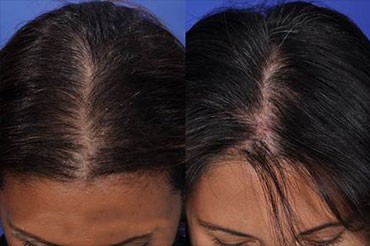There are a number of medical conditions that are related to scalp and infections that cause hair loss. Most of these are conditions result in some type of skin rash. Many scalp conditions are hereditary, but some may be caused by malnutrition or an infection. The treatment and outlook depends on the condition causing the scalp problems.
Types of Scalp Infections

Seborrheic eczema
Seczema, or dermatitis, is a common inflammatory skin condition that causes flaky, scaly patches on the skin, especially the scalp. When those flakes fall off, it is called dandruff. The symptoms typically include itching and irritation accompanied by a patchy, scaly rash. Most people have this yeast on the surface of their skin, but some people are more sensitive to its effects. People with seborrheic dermatitis produce more of a sticky substance called sebum.
Genetics plays a vital role in this type of dermatitis since it often runs in families. It’s also more common in people who have medical conditions that affect the immune system and in people with neurological diseases such as Parkinson’s disease.
Cradle cap or seborrheic eczema in infants.
Cradle cap is a common term for seborrheic dermatitis, which is also known as dandruff in infants and kids. Rough, scaly patches of skin on a newborn’s scalp can be alarming to new parents, but, usually, are nothing to worry about. They are due to a harmless condition many babies develop called cradle cap.
It’s a relatively a common condition in newborns and children up to three years of age and causes thick yellow or white scales on the scalp. Some kids just get scales in a small patch; others have scales all over their heads. Sometimes, cradle cap can even occur on the eyebrows, ears, crease of the nose, eyelids, back of the neck, diaper area, or armpits. In a few cases, such as in babies who have eczema or dry skin, cradle cap can cause cracked skin that itches and oozes a small amount of clear yellow drainage.
Psoriasis
Psoriasis is an inflammatory skin condition that is not uncommon. In many cases, the scalp is affected and develops red, scaly, dry patches. Psoriasis is a chronic skin disease characterized by red patches on the skin and often accompanied by silvery-white scales of dead skin cells. It is an autoimmune disease in which the body’s defense system attacks healthy cells. This leads skin cells that mature and die in less than a week, which is extremely rapid considering normal skill cells mature and replace dead ones usually in a month’s time. While these can occur anywhere on the body, they are more common in some areas including the scalp. This is why psoriasis causes hair loss.
This condition is most likely to occur in people who have psoriasis on other parts of the body. It has the same cause, too—an autoimmune problem that sends signals to the skin to produce new cells too quickly. The condition is painful, itchy, and unsightly.
Ringworm
Ringworm, or tinea capitis, is a fungal skin infection that produces ring-like patches. It is common in children. Ringworm of the scalp is a fungal infection of the scalp and hair shafts. The signs and symptoms of ringworm of the scalp may vary, but it usually appears as scaly, itchy, bald patches on the head. Ringworm of the scalp, a highly contagious infection, is most common in school-age children and toddlers. Some cases of ringworm of the scalp result in severe inflammation at the site of infection that may cause scarring or permanent hair loss.
Scleroderma
Scleroderma is a rare skin disease and connective tissue. It causes skin to develop patches that are tight and hard. Scleroderma is a complex, uncommon, autoimmune disease. The body’s immune system attacks its own tissues. It affects the skin by causing hardened tissue or ulcers and may harm the internal organs.
There are two major forms of the disease. Systemic scleroderma is a serious condition, while localized scleroderma carries a good prognosis and normal lifespan. In children, localized scleroderma is three times more common than the systemic form of the disease.


